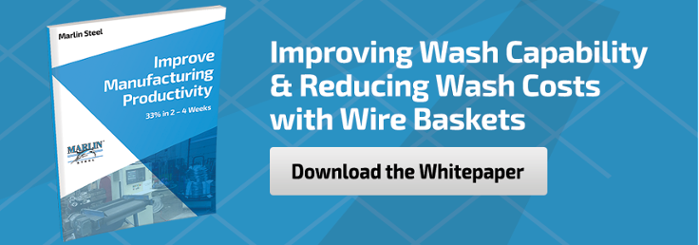 In a few recent speeches by political candidates, the subject of Free Trade Agreements (FTAs) has come up more than a few times. Some are for FTAs; others are against them. The impact of free trade agreements is a matter of some debate among politicians and economists.
In a few recent speeches by political candidates, the subject of Free Trade Agreements (FTAs) has come up more than a few times. Some are for FTAs; others are against them. The impact of free trade agreements is a matter of some debate among politicians and economists.
So, what does Marlin Steel’s leadership think about free trade agreements? Recently, freelance business writer Mark Crawford contacted Marlin CEO Drew Greenblatt with some questions for a piece on free trade agreements.
Here are some of the questions and answers from that interview:
Q: Overall, how would you say free-trade agreements have impacted U.S. manufacturing? Have they impacted your business?
A: Free trade agreements have been wonderful for Marlin. They have opened up new markets for us to sell and helped us expand our U.S. production.
We cannot just sell to the USA and grow because 95% of the world’s consumers are overseas. Being able to sell our company’s products to free trade partners has been a critical source of income for Marlin, fueling growth and jobs.
Q: Is there anything especially good and/or bad about our free-trade agreements?
A: Free trade agreements are not perfect, but they have helped to level the playing field. They eliminate border taxes that otherwise make our goods more expensive and they eliminate discriminatory barriers. When enacted, free trade agreements have helped turbo-charge U.S. exports.
Overall, we have manufacturing trade surpluses (over $10 billion/year) with our FTA deal countries. Compare this to the countries where we don’t have any FTAs, where we have over a $600 billion deficit in trade (such as with China). It’s clear that these agreements help exporters far more than they harm.
Q: Is there any good data/analysis from past free-trade agreements, like NAFTA, that is especially telling?
A: NAFTA was a success for manufacturers. Canada and Mexico are our largest trading partners and we have created a North American industrial supply chain that makes us all more competitive globally.
NAFTA remains one of President Clinton and New Gingrich’s biggest accomplishments. We have more jobs in the USA because of this deal. In fact, manufacturing jobs grew in the four years just after NAFTA by about 800,000. Other factors, such as productivity and technological transformations have reshaped American manufacturing and the U.S. jobs situation.
Q: What about this Trans-Pacific Partnership – good thing or bad thing for U.S. manufacturing?
A: Overall, the TPP can be a great thing for American manufacturing. This will give the U.S. deals with countries where we did not have deals before, and where we are losing market share to China as a result.
We are creating rules of the road that will help make us more competitive. Countries such as Vietnam and Japan will finally follow deals that make it fairer for American companies. $18k+ in tariffs that block U.S. exports will melt away.
Q: If we don’t join free-trade agreements, are we going to lose out and isolate ourselves?
A: Yes, and it’s already happened. We have missed out while the EU, China, and others are closing deals and opening markets that exclude us. These other countries can sell to markets in other countries without tariffs, but our own exporters have to pay tariffs.
We are way behind and the USA worker is the one getting the short end of the stick. We need more trade deals to provide more opportunities to U.S. employees.
Q: Anything You’d like to share about how free trade agreements have affected Marlin? Feel free to share examples.
A: Marlin Steel exports to 39 countries. We trade mostly with countries that the U.S. has current deals with because when we try to export to other countries, we get dinged with tariffs. Opening more deals with other countries will expand our markets and help make us more competitive on a global scale.
Q: Is it the structure of the deal that matters? Have we negotiated bad deals?
A: No deal is “perfect.” Nonetheless, the trade agreements the U.S. has negotiated have been very robust, helping to level the playing field between American companies and foreign companies.
Remember, a “good” or “decent” deal is better than no deal at all. We need more trade to grow the American economy. If we just trade with ourselves, we will all be poorer for it. We need new clients to fuel growth. Every trade deal struck has improved our export climate, which grows jobs.
Q: What would be the ideal free trade agreement for the U.S. and U.S. manufacturing? Or Marlin?
A: It would be the trade deal that:
- Levels the playing field.
- Gives us open access.
- no tariffs.
- no discriminatory barriers.
- Enforces higher standards on intellectual property and transparency.
When we have fair trading rules in place, America wins. Fair trade will empower growth and allow us to hire people from the USA.
Are our current trading agreements perfect? No, their detractors do make fair points. But, these trade agreements do help even the playing field for American companies and are certainly better than not having any agreements at all.



.gif)


